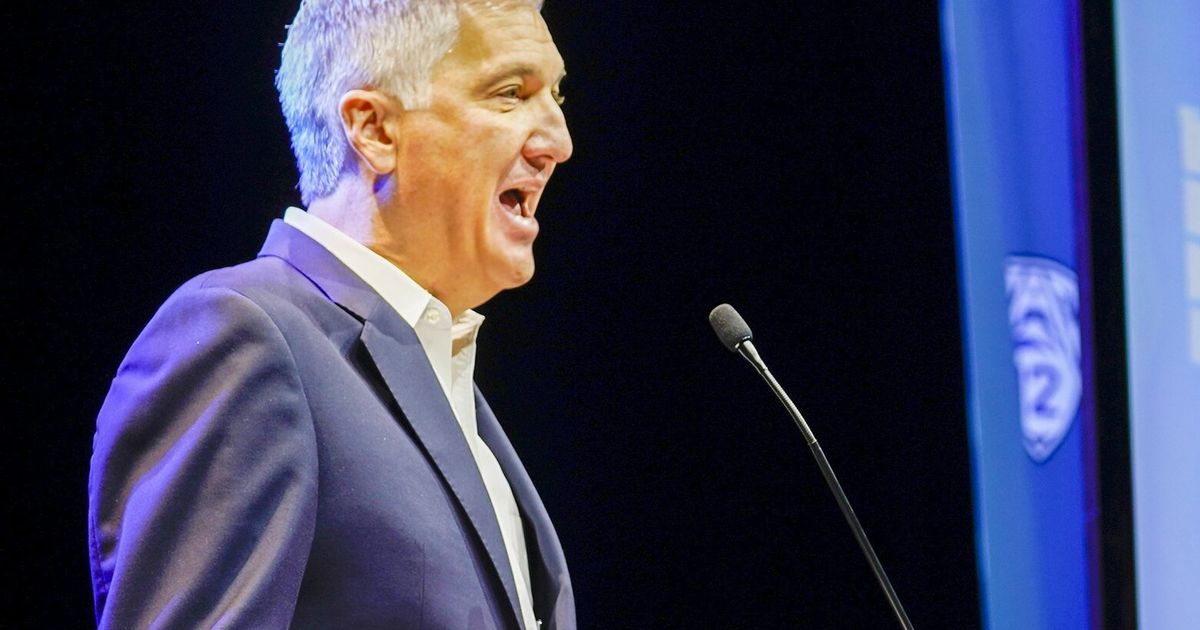
The Hotline continues to closely monitor the financial situation that prompted the dismissal of two Pac-12 executives and could cost the conference $50 million.
Here’s what we have learned in the past 24 hours …
— The Pac-12 will hire a replacement for CFO Brent Willman but not a successor to Pac-12 Networks president Mark Shuken, according to a source with knowledge of the plans.
In combination with the decision to move production facilities to an office in the East Bay, the decision to not replace Shuken provides insight into the future of the networks.
Commissioner George Kliavkoff has stated publicly that the Pac-12 will remain in the content production business during the next media contract cycle, which begins in the summer of 2024.
The decision to lease 42,000 square feet in the East Bay city of San Ramon is evidence of the strategy.
That said, there is no indication the Pac-12 Networks will exist in their current form — as a media distribution company.
In fact, the news release issued two weeks ago about the move to San Ramon was framed this way: The Pac-12 “announced the relocation of its San Francisco production studio …”
It said nothing about the Pac-12 Networks, the linear media company with a national feed and six regional feeds.
If the media company is going away — if it’s being downscaled to a production unit — there’s no need for a network president.
In other words, the model is changing.
Into what? There are at least two options:
- An entity that produces streaming-only content about Pac-12 Olympic sports. (Football and basketball have far too much value to be sequestered on a conference-owned platform.)
- A production facility that provides Pac-12 Olympic sports content and produces sporting events for a major digital media company like Amazon or Apple.
The Pac-12 Networks’ infrastructure is cutting-edge, especially the remote broadcasting technology that eliminates the need for costly production trucks at stadiums and arenas.
— How might the imbroglio impact the Pac-12’s media negotiations with ESPN, Fox and other linear and digital companies?
Bob Thompson, the former president of Fox Sports Networks, wrote the following on Twitter:
“Only way it affects the media deal is if there is an offer to buy Pac-12 Networks as part of the overall deal. If so, this represents 4% of Network revenue and comes straight off the bottom line. The value of the Network goes down and the price has to be renegotiated.”
To this point, there is no indication the Pac-12 Networks will be sold outright.
— Multiple sources have confirmed the Hotline’s original report that the overpayments made by Comcast occurred on a yearly basis and, Comcast asserts, were for approximately $5 million annually over the course of 10 years.
That’s a $50 million bill.
But those same sources believe the Pac-12 won’t write a check to Comcast. Instead, the company will simply withhold payments to the Pac-12 Networks until it has recouped the $50 million.
Comcast is under contract with the networks until the summer of 2024. The math suggests that as a result of the (presumed) withholding of payments, each of the 12 schools will receive about $4 million less in revenue distributions from the conference over the 2023-24 fiscal years.
However, the Pac-12 has an emergency reserve fund.
In the spring of 2020, as the pandemic hit, the Pac-12 had about $22 million stockpiled.
The presidents approved the use of reserves to mitigate the loss of revenue resulting from the cancellation of the Pac-12 and NCAA tournaments.
Exactly how much was tapped, and how much remains, is not clear.
The Pac-12’s tax filing for the 2021 fiscal year shows approximately $18 million in “savings and temporary cash investments.”
At least a portion of that stockpile could be the reserves, potentially available to offset the Comcast revenue hit.
According to conference bylaws, three-quarters of the presidents would have to approve any expenditures from the reserves.
— The Hotline hasn’t confirmed the next step for Shuken and Willman and whether they intend to take legal action against the conference.
The Pac-12’s statement announcing the termination of two (unnamed) senior executives indicated the moves were the result of failing “to disclose material information to the Pac-12 board of directors and external Pac-12 auditors.”
It said nothing about whether they told then-commissioner Larry Scott, who was the chief executive of the Pac-12 Networks.
It’s entirely possible, if not likely, that Shuken reported the results of the audit to Scott immediately in December 2017. (Why nobody told Kliavkoff when he took over in July of 2021 is one of the many mysteries.)
From a legal perspective, what matters is corporate law.
The Pac-12 Networks are an arm of Pac-12 Enterprises, which is legally registered in Delaware.
The wording of the Pac-12’s statement — failing to disclose “material information” to the board or external auditors — suggests they had fiduciary duties to inform the Pac-12 board and external auditors under at least Delaware law.
In a general sense, Delaware law states the following:
“The directors and officers of Delaware corporations owe the corporation and its shareholders a fiduciary duty of loyalty and a fiduciary duty of care. The duty of loyalty requires them to put the best interests of the corporation and shareholders above their personal interests and to act in good faith. The duty of care requires directors and officers to make informed decisions.”
The extent to which Shuken and Willman executed the “duty of loyalty” and the “duty of care” — and the specific requirements within those broad frameworks — could be relevant if legal action unfolds.